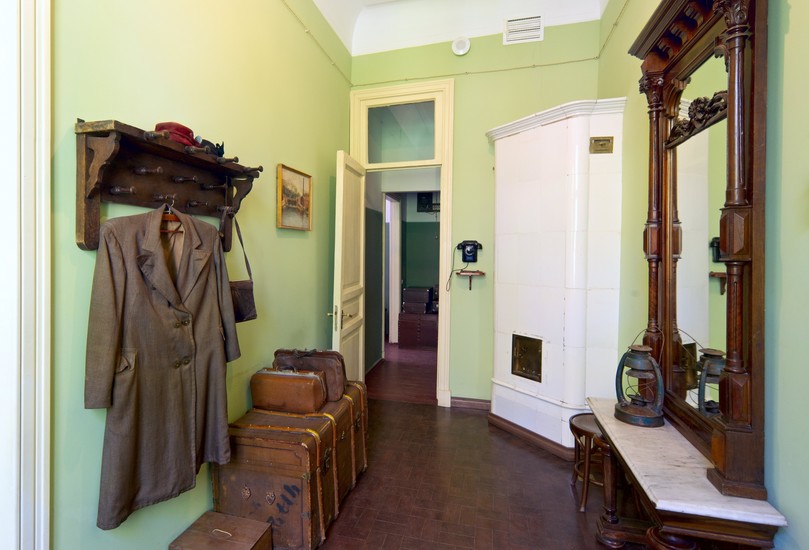Anna Akhmatova is regarded as one of the greatest Russian poets of the 20th century. Her most notable work is Requiem, but she wrote hundreds of poems throughout her life. Our group went to the Anna Akhmatova Museum in Saint Petersburg to learn more about the life of this influential poet of early Soviet times.
When first stepping into the museum, I was surprised by how small the living quarters actually were. The museum was located in old communal apartment from the Soviet era. We were greeted by a friendly guide, who first showed the entry room. She told us the coat hanging by the door actually was worn by and belong to Anna’s third husband, Nikolai Punin! I found that to be a unique piece of history. Moving through the apartment, we stopped in the kitchen, then a short hallway. The guide noted that Akhmatova’s son from her first marriage resided in this tiny hall for a few years before being imprisoned under Stalin’s regime.

Image from https://www.inyourpocket.com/st-petersburg-en/anna-akhmatova-museum_9783v
After passing through another short, small hallway, we entered my favorite exhibit at the museum. The walls were covered in poems written by Anna Akhmatova, and pictures from her life were littered throughout the poems, as well as portraits of her and other artifacts from her life. Here, the guide told us more about Akhmatova’s poetry. Much of it was anti-Stalinist, and understandably so; Stalin’s regime took many people from her inner circle of friends and family and imprisoned or killed them. The imprisonment that affected her most was that of her son, Lev, who was imprisoned for being the son of Nikolai Gumilev, Anna’s first husband. Nikolai was imprisoned and shot early in the Soviet era. Anna would stand in a line for hours for the chance to give Lev food, and plead for his release. I recall our lecturer from class telling us she wrote a poem praising Stalin, a man she despised, just for the chance for her son to be released. Lev remained in a Siberian labor camp until 1956.
Although Anna Akhmatova’s work was banned, and she was being watched by the government, she still made poetry. The tour guide told us how she would write a few lines, and memorize them quickly before throwing them in the fire, as to not have evidence for the regime to arrest her. Many poets of this time practiced this secretive ritual, and it is believed that many poems of this era were lost simply because poets would be arrested for having their poetry. I find this to be sad. What great poets would we know about today had their poems been allowed to be published, instead of just quickly memorized before the words were burnt to ashes?
Next the group moved past a few rooms containing chairs and the occasional bed. These were the rooms where Akhmatova resided throughout her time in Saint Petersburg. I found it interesting how she lived one room over from her husband, even after their marriage was dissolved. Anna Akhmatova lived a difficult life, and did not change herself during the Soviet era, but continued to write about what she experienced, against the wishes of the Stalinist regime, showing her perseverance and bravery in a time when she could have just given up.
After Stalin’s death, Anna Akhmatova experienced a little more freedom, but still not enough to publish her poem Requiem in it’s entirety. She was given an honorary degree from Oxford University in England, as well as several other awards. Shortly after her return to Russia, she had a heart attack and died a few months later in the spring of 1966, at the age of 76. Her life had such a strong impact on many citizens under Stalin’s rule of terror. She acted as a voice for the oppressed people in Saint Petersburg for most of her life, recording what horrors they all went through. The museum was opened on what would have been Anna Akhmatova’s 100th birthday to commemorate her life. I found it to showcase her strength in times of hardship, which to me was very inspiring.

References:
Lecture about Russian Literature
Tour of Anna Akhmatova Museum
http://www.russianmuseums.info/M127
I thought it was so interesting that she would memorize her poems and then destroy the written copies to avoid arrest. Akhmatova seemed to live a pretty tough, sad life. I thought the room with her poems and newspapers on the walls was one of the coolest rooms as well. I also really liked that they had the wallpapers still on the walls.
Having the museum be in Akhmatova’s place of living was surreal. It was a very interesting experience and dived deeper into what this regime meant for authors. I had no idea the amount of censorship and hardships poets faced during this time. I agree with you, many beautiful pieces of literature and prose were taken away from us due to the regime. It makes me sad to think about all this lost art that none of us will ever get to experience. This was a very thought provoking tour, one that I will never forget.